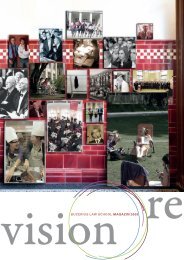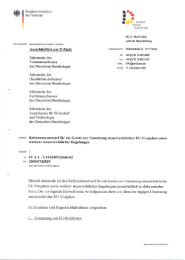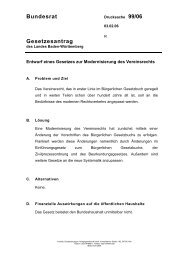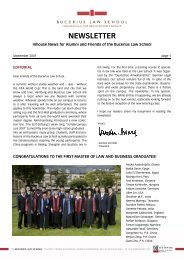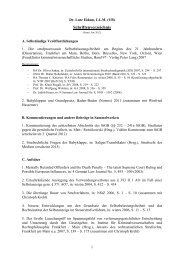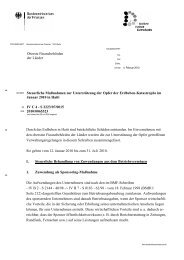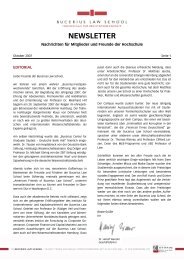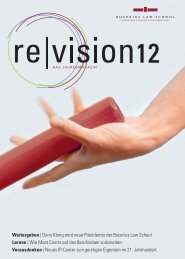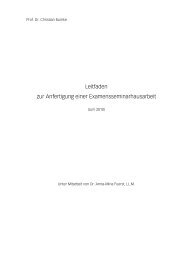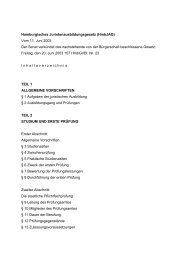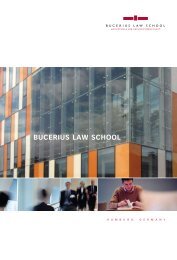Course Catalogue 2012 - Bucerius Law School
Course Catalogue 2012 - Bucerius Law School
Course Catalogue 2012 - Bucerius Law School
Create successful ePaper yourself
Turn your PDF publications into a flip-book with our unique Google optimized e-Paper software.
INT INTERNATIONAL INT INTERNATIONAL<br />
ERNATIONAL EXCHANGE PROGRAM PROGRAM 201 <strong>2012</strong> 201<br />
COURSE COURSE CATALOGUE<br />
CATALOGUE<br />
1. ACADEMIC CALENDAR<br />
2. COURSE LIST<br />
3. COURSE DESCRIPTIONS<br />
4. FACULTY BIOGRAPHIES<br />
1
ACADEMIC ACADEMIC ACADEMIC CALENDAR<br />
CALENDAR<br />
August August 1 1 – 15 Online course pre-registration<br />
September September September 5 – 7 Orientation Program (mandatory)<br />
September September September 10 Session I: <strong>Law</strong> and German language classes begin<br />
October October 3 3<br />
German Reunification Day (national holiday)<br />
October October 5 5<br />
<strong>Bucerius</strong> Academic Ceremony<br />
October October 19 19<br />
Session I ends<br />
October October 22 22 – 26 26 26<br />
Exam Week Session I<br />
October October 229<br />
2 – November 2 Study break<br />
October October 28 28 – November 11<br />
1<br />
Study trip to Berlin and Potsdam (optional)<br />
November November 5 5<br />
Session II begins<br />
December December 14 Session II ends<br />
December December December 117<br />
11<br />
7 7 – 21 Exam Week Session II<br />
December December December 21 21<br />
Farewell Ceremony<br />
2
COURSE COURSE LIST<br />
LIST<br />
SESSION SESSION I: I: September September 10 10 – October 19 19, 19<br />
, 20 <strong>2012</strong> 20 <strong>2012</strong><br />
12<br />
<strong>Course</strong> <strong>Course</strong> Name Name<br />
Lecturer Lecturer<br />
Home Home Institution Credits<br />
Comparative <strong>Law</strong> Prof. Dr. Hein Kötz<br />
Corporate <strong>Law</strong><br />
Global Trends in<br />
Intellectual Property and<br />
Digital Media <strong>Law</strong> **<br />
International Conflict<br />
of <strong>Law</strong>s<br />
Introduction<br />
to Comparative<br />
Intellectual Property <strong>Law</strong><br />
Introduction<br />
to White Collar Crime<br />
The Private <strong>Law</strong><br />
of International Trade<br />
Prof. Dr. Karsten<br />
Schmidt<br />
Dr. Carsten Jungmann<br />
Dr. Eva Micheler<br />
Prof. Dr. Dana<br />
Beldiman<br />
Prof. Dr. Peter Hay<br />
Prof. Dr. Dana<br />
Beldiman<br />
Beatrice Krebs<br />
Dr. Thomas Krebs<br />
Max Planck Institute for Foreign &<br />
Int’l Private <strong>Law</strong> (Hamburg,<br />
Germany) & Founding President<br />
of <strong>Bucerius</strong> <strong>Law</strong> <strong>School</strong><br />
<strong>Bucerius</strong> <strong>Law</strong> <strong>School</strong><br />
Duvinage Laywers (Munich,<br />
Germany) & <strong>Bucerius</strong> <strong>Law</strong> <strong>School</strong><br />
London <strong>School</strong> of Economics and<br />
Political Science (UK)<br />
Carroll, Burdick & McDonough<br />
LLP (San Francisco, USA)<br />
& <strong>Bucerius</strong> <strong>Law</strong> <strong>School</strong><br />
Emory University <strong>School</strong> of <strong>Law</strong><br />
(USA)<br />
Carroll, Burdick & McDonough<br />
LLP<br />
(San Francisco, USA)<br />
Oxford University, St. Hilda’s<br />
College (UK)<br />
Oxford University,<br />
Brasenose College (UK)<br />
1 ABA<br />
/ 2 ECTS<br />
2 ABA<br />
/ 4 ECTS<br />
1 ABA<br />
/ 2 ECTS<br />
2 ABA<br />
/ 4 ECTS<br />
1 ABA<br />
/ 2 ECTS<br />
1 ABA<br />
/ 2 ECTS<br />
2 ABA<br />
/ 4 ECTS<br />
Partici-<br />
Partici<br />
pants<br />
pants<br />
3<br />
50<br />
50<br />
tba<br />
50<br />
50<br />
50<br />
50
SESSION ESSION ESSION II: II: November November 5 5 – December 14, 14, <strong>2012</strong><br />
<strong>Course</strong> <strong>Course</strong> <strong>Course</strong> Name Name<br />
Lecturer Lecturer<br />
Home Institution Credits<br />
Business Mediation &<br />
Conflict Resolution<br />
Comparative Products<br />
Liability<br />
Prof. Dr. Lars<br />
Kirchhoff<br />
Felix Wendenburg<br />
Prof. Vernon Palmer<br />
Corporate Governance Dr. Carsten Jungmann<br />
International Banking<br />
Transactions<br />
International and<br />
Comparative Antitrust<br />
<strong>Law</strong><br />
International<br />
Commercial Arbitration<br />
Introduction to the <strong>Law</strong><br />
of the EU<br />
BOTH BOTH SESSIONS<br />
SESSIONS<br />
Dr. Christof Maria<br />
Fritzen<br />
Dr. André Fiebig<br />
Dr. Stefan Kröll<br />
Prof. Dr. Jörn Axel<br />
Kämmerer<br />
Paulina Starski<br />
European University Viadrina,<br />
(Frankfurt/O., Germay)<br />
& TGKS <strong>Law</strong> Firm (Berlin,<br />
Germany)<br />
Tulane University <strong>Law</strong> <strong>School</strong><br />
(USA)<br />
Duvinage Laywers (Munich,<br />
Germany) & <strong>Bucerius</strong> <strong>Law</strong> <strong>School</strong><br />
Retired Managing Director of<br />
Deutsche Bank AG (Germany)<br />
Baker & McKenzie (Chicago, USA)<br />
& Northwestern University <strong>Law</strong><br />
<strong>School</strong> (USA)<br />
<strong>Law</strong>yer / Arbitrator<br />
(Cologne, Germany)<br />
<strong>Bucerius</strong> <strong>Law</strong> <strong>School</strong><br />
2 ABA<br />
/ 4 ECTS<br />
2 ABA<br />
/ 4 ECTS<br />
2 ABA<br />
/ 4 ECTS<br />
1 ABA<br />
/ 2 ECTS<br />
2 ABA<br />
/ 4 ECTS<br />
2 ABA<br />
/ 4 ECTS<br />
1 ABA<br />
/ 2 ECTS<br />
<strong>Course</strong> <strong>Course</strong> Name Name<br />
Lecturer Lecturer<br />
Home Institution Institution Credits Credits<br />
Credits<br />
German <strong>Law</strong> Survey<br />
<strong>Course</strong>*<br />
Contract Drafting<br />
for Non-Native English<br />
Speakers<br />
International<br />
Commercial<br />
Transactions**<br />
<strong>Bucerius</strong> Professors <strong>Bucerius</strong> <strong>Law</strong> <strong>School</strong><br />
James Faulkner <strong>Bucerius</strong> <strong>Law</strong> <strong>School</strong><br />
Prof. Dr. Karsten Thorn <strong>Bucerius</strong> <strong>Law</strong> <strong>School</strong><br />
2 ABA<br />
/ 4 ECTS<br />
1 ABA<br />
/ 2 ECTS<br />
1 ABA<br />
/ 2 ECTS<br />
Partici-<br />
Partici<br />
pants<br />
pants<br />
22<br />
50<br />
36<br />
50<br />
50<br />
45<br />
50<br />
Partici Partici-<br />
Partici<br />
pants<br />
pants<br />
4<br />
all<br />
36<br />
n/a
Negotiation Michael Friedman<br />
Practical Aspect of<br />
Mergers & Acquisitions<br />
The Business and<br />
Economics of <strong>Law</strong><br />
Firms: Cross-Border<br />
Edition<br />
Pl Please Pl<br />
ease note:<br />
Max Planck Institute for Comp.&<br />
Int’l Private <strong>Law</strong> (Hamburg,<br />
Germany)<br />
Dr. Nils Krause DLA Piper (Hamburg, Germany)<br />
Bruce Elvin<br />
Markus Hartung<br />
Duke <strong>Law</strong> <strong>School</strong>, USA<br />
<strong>Bucerius</strong> Center for Legal<br />
Profession, Germany<br />
1 ABA<br />
/ 2 ECTS<br />
2 ABA<br />
/ 4 ECTS<br />
1 ABA<br />
/ 2 ECTS<br />
* The German <strong>Law</strong> Survey <strong>Course</strong> is mandatory for all international exchange students.<br />
** <strong>Course</strong> will be offered jointly for exchange students and German LL.B. students.<br />
22<br />
36<br />
15<br />
5
COURSE COURSE DESCRIPTIONS<br />
DESCRIPTIONS<br />
COURSES COURSES SESSION SESSION I I ( (SEPT ( SEPT SEPT. SEPT . 10 - OCT. OCT. 19 19, 19<br />
, 201 <strong>2012</strong>) 201<br />
COMPARATIVE COMPARATIVE LAW<br />
LAW<br />
BY BY PROF. PROF. DR. DR. HEIN HEIN KÖTZ KÖTZ<br />
KÖTZ<br />
This course starts with a general introduction to the methods and purposes of comparative<br />
law. It then focuses on the nature of law and legal institutions in civil law and common law<br />
countries. The emphasis will not be on substantive law, but on a comparative discussion of the<br />
machinery of justice in civil and common law, their legal professions, judiciaries, methods of<br />
legal education and the main differences in the adjudication of civil cases.<br />
CORPORATE CORPORATE LAW LAW: LAW : GERMANY’S APPROACH AND A COMPARATIVE PERSPECTIVE<br />
BY BY DR. DR. CARSTEN CARSTEN JUNGMANN<br />
JUNGMANN, JUNGMANN , DR.EVA MICHELER & PROF. PROF. DR. DR. DRES. H.C. KARSTEN SCHMIDT<br />
The lecture on corporate law consists of two parts. The first is on German corporate and<br />
partnership law and its European implications; the second pursues a comparative approach<br />
and introduces corporate law of Romanic countries from a Latin American point of view.<br />
Students will be introduced to the legal and practical concepts of corporations and<br />
partnerships. At the end of the course, they will be able to distinguish between the available<br />
business forms and to judge their specific advantages depending on the needs of a particular<br />
business as well as on risks for shareholders and creditors dealing with the company.<br />
The main focus of the course will be on marketable share corporations and on close<br />
corporations (which have a huge economic importance in Germany). The course will analyze<br />
the concept of limited liability and contrast it to liability rules in partnerships. With regard to<br />
marketable share corporations, a special emphasis will be placed on the central problems of<br />
corporate governance and corporate finance.<br />
GLOBAL GLOBAL TRENDS TRENDS IN IN INT INTELLECTUAL INT INT ELLECTUAL PROPERTY AAND<br />
A<br />
D DIGITAL MEDIA LAW<br />
LAW<br />
BY BY PROF. PROF. DR. DR. DANA DANA BELDIMAN<br />
BELDIMAN<br />
Please Please note note that that that this this this course course course will be offered jointly for exchange xchange students students and and and German German German LL.B. LL.B.<br />
LL.B.<br />
students. tudents.<br />
The course will examine some of the most important emerging developments on the fields of<br />
intellectual property and online law. <strong>Law</strong> and policy concerns will be discussed at national and<br />
international level. Specific topics covered might include patent law and global access to<br />
medicines; liability of online intermediaries for copyright and trademark infringement; the<br />
functionality limits of trademarks; use of international conventions to obtain IP rights<br />
internationally, licensing of IP rights.<br />
Prerequisites: “Introduction to Comparative Intellectual Property” (D. Beldiman) or a course on<br />
patent, trademark, copyright or equivalent at your home law school.<br />
6
INTERNATIONAL INTERNATIONAL CONFLICT CONFLICT CONFLICT OF OF LAWS<br />
LAWS<br />
BY BY PROF. PROF. DR. DR. PETER PETER HAY<br />
HAY<br />
Private international law (“conflict of laws” or “conflicts,” in American and, increasingly, in<br />
English and Canadian usage) deals with the special problems that arise when the facts of a<br />
case are “connected” to different countries. Examples include a contract made in one, but to<br />
be performed in another country; a tort committed abroad; a decedent’s estate with assets in<br />
different countries; or a foreign divorce, perhaps with support and custody problems involving<br />
more than one country.<br />
The course has two principal parts. On the procedural (litigation) side it deals with prerequisites<br />
for the exercise of jurisdiction over foreign defendants, questions of service and of obtaining<br />
evidence abroad, and with the recognition and enforcement in one country of judgments<br />
rendered in another as well as defenses thereto. The second part deals with the question:<br />
which law applies? This includes the effect of a choice-of-law agreement by the parties,<br />
statutory or case law default rules for the determination of the applicable law, the effect of<br />
overriding mandatory local rules (e.g., for consumer protection) and how to determine the<br />
content of applicable foreign law.<br />
The primary focus is on the conflicts law of the European Union (EU law and national member<br />
state law) with comparative consideration of US, Canadian and Chinese law.<br />
THE THE PRIVATE PRIVATE LAW LAW OF OF INTERNATIONAL INTERNATIONAL TRADE TRADE<br />
TRADE<br />
BY BY BY DR. DR. THOMAS THOMAS KREB KREBS KREB<br />
This course takes as its subject matter a sale of goods by a seller in one country to a buyer in<br />
another, and examines the contractual relations between the various parties that may be<br />
involved in the making and performance of such a sale.<br />
Accordingly, it is concerned first with the relations between buyer and seller, emphasizing the<br />
special features of the sale which are due to its international character. This part of the course<br />
will study the Convention on the International Sale of Goods (CISG) in some detail.<br />
Secondly, it is concerned with the carriage of goods from the seller to the buyer, once again<br />
emphasizing the special rules which govern international carriage. So as to keep the course<br />
within reasonable bounds, it deals only with carriage by sea and does not cover the special<br />
rules governing international carriage by air, road and rail. In practice, most sea carriage<br />
contracts will be governed by English law; this part of the course is likewise based on English<br />
law, although will also look at the Hague Rules, the Hamburg Rules and the new Rotterdam<br />
Rules.<br />
Thirdly, the course deals with an aspect of banking law. Payment in international sales is often<br />
made not directly by buyer to seller, but through the mechanism of a banker’s commercial<br />
credit; the law relating to such credits forms the third part of the course. In particular, we are<br />
going to study the Uniform Customs and Practice for Documentary Credits (UCP 600) in some<br />
detail.<br />
7
What the course is not concerned with is the public law of international trade (sometimes<br />
referred to as international economic law) – as such, the course will not cover the GATT/WTO,<br />
subsidies, anti-dumping or the IMF.<br />
The course will be delivered using a combination of lectures and seminars.<br />
INTRODUCTION INTRODUCTION TO TO TO COMPARATIVE COMPARATIVE INTELLECTUAL PROPERTY<br />
BY PROF. DR. DR. DANA BELDIMAN<br />
The course introduces students to the main forms of intellectual property protection laws –<br />
patent, copyright, trademark, industrial design, geographical indications, their economic<br />
justifications, requirements for protection and scope of protection. The topics will be<br />
approached from a comparative perspective, highlighting, as relevant, aspects of IP laws from<br />
the EU and the US, as well as from some emerging countries.<br />
A further focus of the course will be the interaction of national norms in the international<br />
intellectual property arena, including elements of TRIPS, the Berne and Paris Conventions, the<br />
Patent Cooperation Treaty and the Madrid System, as relevant to securing IP rights<br />
internationally and to current developments in international intellectual property.<br />
INTRODUCTION INTRODUCTION TO TO WHITE WHITE WHITE COLLAR COLLAR CRIME<br />
CRIME<br />
BY BY BEATRICE BEATRICE KREBS KREBS<br />
KREBS<br />
This course explores some economic and political crimes lumped together under the collective<br />
term “white collar crime.” Because most white collar crime is prosecuted in the US, the<br />
primary focus will be on US federal law; however, reference will be made to other common law<br />
and civil law jurisdictions when dealing with those doctrines that allow criminal liability to be<br />
imposed on corporations for the criminal activity of individuals. We will be examining<br />
distinctions between “crime in the suites” and “crime in the streets” and the arguments for<br />
and against white collar offences and white collar law enforcement. The course aims to offer<br />
an introductory overview only; offences addressed will be limited to mail and wire fraud,<br />
securities fraud and insider trading, extortion and bribery.<br />
COURSES COURSES SESSION SESSION SESSION II II ( (NOV. ( NOV. 5 - DEC. DEC. DEC. 14 14, 14 , <strong>2012</strong> <strong>2012</strong>) <strong>2012</strong><br />
BUSINESS BUSINESS MEDIATION MEDIATION MEDIATION & & & CONFLICT CONFLICT RESOLUTION<br />
BY BY BY PROF PROF. PROF PROF.<br />
. DR. DR. LARS LARS KIRCHHOFF KIRCHHOFF & FELIX WENDENBURG, LL.B.<br />
This course aims to teach both the practical skills and the theoretical background of<br />
professional conflict management and resolution, with a focus on the interest-based method<br />
of mediation. Several areas of business mediation are introduced, including workplace<br />
mediation as well as the interplay between mediation and arbitration. The main subject during<br />
the first class is conflict and communication analysis, followed by the techniques and methods<br />
of mediation. Students learn to deal with conflicts systematically and constructively by means<br />
8
of several role plays and simulations, which are individually analyzed. Class preparation<br />
includes reading articles and book excerpts. Students are graded on the basis of an essay.<br />
COMPARATIVE COMPARATIVE PRODUCTS PRODUCTS LIA LIABILITY LIA LIABILITY<br />
BILITY: BILITY PRODUCTS PRODUCTS LIABILITY LIABILITY IIN<br />
I N THE THE UNITED STATES WITH<br />
EUROPEAN EUROPEAN COMPARISONS<br />
COMPARISONS<br />
BY BY PROF. PROF. VERNON VERNON PALMER<br />
PALMER<br />
Part I of this course deals with the major issues of products liability law in the US. The course<br />
covers the boundaries of the subject matter (what are and are not “products”), the rise of strict<br />
liability and unique features of this law in the US, such as the use of punitive damages and<br />
class actions. Theoretical and practical questions relating to liability for defective design and<br />
failure to warn will also be discussed.<br />
Part II of the course is devoted to the European Directive on products liability and three case<br />
studies that will permit the students to compare and contrast the experience in many<br />
European countries with that in the US.<br />
CORPORATE CORPORATE GOVERNANCE<br />
GOVERNANCE<br />
GOVERNANCE<br />
BY BY DR. DR. DR. CARSTEN CARSTEN CARSTEN JUNGMANN<br />
JUNGMANN<br />
Corporate governance primarily concerns the (executive) directors’ fiduciary duties as well as<br />
the tasks and rights of those who have control of the management (non-executive directors,<br />
members of the supervisory board, shareholders). The course focuses on corporate<br />
governance in stock corporations and deals in detail with the German Corporate Governance<br />
Code. As the course takes a comparative approach, recent trends on the European level, as<br />
well as in the US and in the UK, are taken into account.<br />
For this course, students are strongly recommended to have completed the “Corporate <strong>Law</strong>”<br />
course (or an equivalent course in their home country). As case studies form an integral part of<br />
this course, all students should be willing to take part in group work / group presentations.<br />
Prerequisites: “Company <strong>Law</strong>” (Schmidt, Jungmann, Micheler) or equivalent course at your<br />
home law school.<br />
INTERNATIONAL INTERNATIONAL BANKIN BANKING BANKIN G TRANSACTIONS<br />
BY BY DR. DR. CHRISTOF CHRISTOF MARI MARIA MARI MARI A FRITZEN<br />
This course, conducted by a former lawyer and banker, is an introductory survey on basic<br />
international banking products and transactions, such as deposits, forwards, futures, swaps,<br />
options, project financing and securitizations. Discussions will focus on (1) the purpose of<br />
these transactions and their economic / financial workings and risk profiles and (2) their legal<br />
requirements, documentation and advisory needs, and will give an introduction into the<br />
regulatory aspects driving many of these transactions. The materials for this short course<br />
include landmark cases, scholarly writings, samples of real-life documentation, instructions for<br />
a negotiation session and other readings. No in-depth financial and / or banking knowledge is<br />
required.<br />
9
INTERNATIONAL INTERNATIONAL AND AND COMPARATIVE COMPARATIVE COMPARATIVE ANTITRUS ANTITRUST ANTITRUS ANTITRUST<br />
T LAW<br />
BY BY DR. DR. DR. ANDRÉ ANDRÉ ANDRÉ FIEBIG<br />
FIEBIG<br />
The number of countries that have adopted competition laws has increased dramatically in the<br />
past 20 years and not just in developed countries with mature market economies, but also in<br />
many developing countries. Commensurate with the explosion of the number of competition<br />
law regimes has been the globalization of business activity. The significance of national<br />
borders as a barrier to business activity has decreased. As the application of competition law<br />
is based on the effects of the business transaction and not on the location of the perpetrators,<br />
these two factors - globalization and the increase in the number of competition law regimes -<br />
have led to conflict, compliance costs and the need for solutions, including a more in-depth<br />
understanding of foreign competition laws. An understanding of multiple competition law<br />
regimes is not just an academic curiosity, but a business necessity. This survey course is<br />
designed to explore themes raised in the literature and in practice related to comparative and<br />
international antitrust and competition law. The course will explore the implications this has<br />
not only in developed countries, but also in developing countries that have adopted<br />
competition laws.<br />
INTERNATIONAL INTERNATIONAL COMM COMMERCIAL COMM COMMERCIAL<br />
ERCIAL ARBITRATION<br />
ARBITRATION<br />
ARBITRATION<br />
BY BY DR. DR. STEFAN STEFAN STEFAN KRÖLL<br />
KRÖLL<br />
The course covers arbitration as a dispute resolution process for international trade and<br />
business disputes. It analyzes the different forms, contractual and legal bases, and advantages<br />
of arbitration. Issues discussed include the arbitration agreement, the jurisdiction of the arbitral<br />
tribunal, the role of the courts during and after arbitration proceedings and the recognition and<br />
enforcement of arbitral awards. The course gives special attention to the international<br />
framework of arbitration, in particular the UNCITRAL Model <strong>Law</strong> on International Commercial<br />
Arbitration, which forms the basis of the national arbitration laws in more than 50 states, as<br />
well as the New York Convention (UN Convention on Recognition and Enforcement of Foreign<br />
Arbitral Awards), which has been ratified by more than 140 states and regulates the<br />
recognition and enforcement of arbitration agreements and awards worldwide. Thus the<br />
course focuses on commercial arbitration as an international phenomenon and not on<br />
arbitration under any particular national system.<br />
Recommended literature:<br />
(1) <strong>Course</strong> Reader<br />
(2) Lew / Mistelis / Kröll, Comparative International Commercial Arbitration, Kluwer <strong>Law</strong><br />
International, 2003. (Available in the <strong>Bucerius</strong> library – the book may also be purchased with a<br />
considerable student discount in class.)<br />
INTRODUCTION INTRODUCTION TO TO THE LAW OF THE EU EU<br />
BY PROF. DR. JÖRN AXEL KÄMMERER KÄMMERER & & PAULINA STARSKI<br />
The course aims at providing an insight into the structures, legal basis and law-making of the<br />
European Union. The first part deals with the “institutional law” of the European Union: its<br />
history and development; the main characteristics of EU law; its relation to national law;<br />
competences and tasks of EU institutions; judicial protection. The substantive law of the EU is<br />
10
dealt with in the second part of the course. It encompasses the EU “freedoms” (free<br />
movement of goods; free movement of workers; right of establishment and freedom to provide<br />
services; free movement of capital and payments) as well as an introduction to EU competition<br />
law (prohibition of cartels, abuse of dominant positions and State aids). In both parts, some<br />
reference is given to case law as provided for by the jurisprudence of the Court of Justice of<br />
the European Communities (ECJ).<br />
COURSES COURSES SPANNING SPANNING BOTH BOTH BOTH SESSIONS SESSIONS (SEPT. (SEPT. 10 10 - DEC. DEC. 14 14, 14 , <strong>2012</strong> <strong>2012</strong>) <strong>2012</strong><br />
CONTRACT CONTRACT DRAFTING DRAFTING DRAFTING FOR FOR NON NON-NATIVE<br />
NON NATIVE ENGLISH ENGLISH SPEAKERS<br />
SPEAKERS<br />
BY BY JAMES JAMES JAMES FAULKNER FAULKNER<br />
FAULKNER<br />
The course opens with a presentation on how law, language and business factors interact<br />
when drafting and then looks at the structure of a contract (the main types of clauses and their<br />
purpose, essential drafting language, methods of interpreting contracts). Students analyze<br />
case studies to explore the basic concepts of drafting in a practical business situation. The<br />
course also takes a closer look at the concepts of ‘obligation’ (personal and impersonal),<br />
‘prohibition’, ‘discretionary rights’, ‘condition’, and ‘policy’ - again relating language to business<br />
situations and requirements. On the legal side we look at selected Anglo-American legal<br />
concepts as a background to drafting international contracts in English, including legal<br />
remedies for breach, consideration and the 'deed'; liquidated damages / penalty,<br />
representations and warranties, exclusion of liability, as well as consequential damages. The<br />
course also analyzes a sales agreement and a distribution agreement from the drafting point of<br />
view. The workshop is practical, with assignments based on business situations and advice on<br />
the finer points of drafting using expressions for 'time,' 'money,' 'best efforts,' as well as issues<br />
of layout, punctuation, and the use of expressions like 'such,' 'by/until,' etc.<br />
GERMAN GERMAN LAW LAW SURVEY SURVEY COURSE<br />
COURSE<br />
BY BY BUCERIUS BUCERIUS PROFESSORS<br />
PROFESSORS<br />
Please Please note note that that this this course course is is mandatory mandatory for for all all exchange exchange students.<br />
students.<br />
The course commences with an introduction of the basic features of the German Legal System<br />
and covers all major aspects of German law over the course of the semester. This year's topics<br />
include: German Constitutional <strong>Law</strong> - historical background, basic principles, fundamental<br />
rights and constitutional complaint; German Administrative <strong>Law</strong> - general principles,<br />
administrative act and other types of administrative action; administrative and judicial review;<br />
as well as criminal law, contract law, tort law, company law and corporate taxation.<br />
11
INTERNATIONAL INTERNATIONAL COMMER COMMERCIAL COMMER CIAL TRANSACTIONS<br />
TRANSACTIONS<br />
BY BY PROF. PROF. DR. DR. KARSTEN KARSTEN KARSTEN THORN THORN<br />
Please Please note note that that this this course course course will be offered jointly jointly for exchange xchange students students and German LL.B.<br />
students. tudents.<br />
This course introduces international commercial law. As this field of law is considerably<br />
influenced by trade practice, attention is not only paid to international conventions, but also to<br />
model laws and standard forms. The interplay between the "lex mercatoria" and international<br />
commercial arbitration as an autonomous system to solve commercial disputes is shown.<br />
Where it seems appropriate, case studies illustrate the problems raised and their solutions.<br />
NEGOTIATION<br />
NEGOTIATION<br />
BY BY MICHAEL MICHAEL FRIEDMAN<br />
FRIEDMAN<br />
Over the duration of 6 class sessions, the negotiation course will introduce students to the field<br />
of negotiation as modernly conceptualized, striking a balance between its understanding as an<br />
academic field which may be understood abstractly and a "soft interpersonal skill" demanding<br />
practice and refinement. Using a variety of negotiating simulations and bargaining games, the<br />
course will consider negotiation terminology, concepts, tactics and strategy. In particular, the<br />
module will focus on approaches to single issue (distributive) and multiple issue (integrative)<br />
negotiations. A debriefing which takes place after the conclusion of each simulation allows<br />
participants to consider the dynamic of their individual negotiation and critically reflect on their<br />
individual strengths and weaknesses.<br />
Attendance at all class sessions is mandatory. Grades will be assigned on the basis of final<br />
essay as well as one or two short written tasks. A course reader will be provided.<br />
PRACTICAL PRACTICAL ASPECTS ASPECTS OF OF MERGERS MERGERS AND AND ACQUISITIONS<br />
ACQUISITIONS<br />
BY BY DR. DR. NILS NILS KRAUSE<br />
KRAUSE<br />
This course provides a broad overview of corporate mergers and acquisitions and an<br />
understanding of the conceptual framework. It covers all relevant steps in the M&A process<br />
from acquisition finance to post-closing and integration measures. Other specific subjects<br />
covered are preliminary agreements (e.g. letter of intent, head of terms), due diligence<br />
process, negotiating share purchase agreements and hostile takeovers, including defense<br />
measures and distressed M&A transactions. Students are exposed to the most important<br />
elements of a typical M&A transaction, including relevant contractual provisions.<br />
The course takes an interactive, practical approach to the topic and centers on hypothetical<br />
M&A scenarios. These scenarios are used to illustrate the legal and practical context in which<br />
mergers and takeovers take place. Throughout the course, students are asked to address<br />
these topics from the perspective of the various players in an M&A process (e.g. by negotiating<br />
a letter of intent, conducting a due diligence or negotiating a share purchase agreement).<br />
12
THE THE BUSINESS BUSINESS AND AND ECONOMICS ECONOMICS OF OF OF LAW FIRMS FIRMS: FIRMS<br />
: CROSS CROSS-BORDER CROSS BORDER EDITION EDITION<br />
EDITION<br />
BY BRUCE BRUCE EELVIN<br />
E LVIN & & MARKUS HARTUNG<br />
This course provides students with an enhanced and vital understanding of law firms as<br />
business entities in a competitive and global market. Based on feedback from employers,<br />
interviews with hundreds of lawyers and published accounts from law firm leaders, it is clear<br />
that technical legal ability will be necessary but not sufficient to excel in the practice of law or<br />
any business endeavor in coming decades. The topics will be explored through the review and<br />
analysis of literature, statutes and case studies, and will include a basic financial analysis of the<br />
operations of law firms. Assignments will be case studies and will simulate the client advisory<br />
process, allowing students to gain experience providing legal advice and business<br />
recommendations.<br />
Associate Dean and senior lecturing fellow Bruce Elvin will lead and organize a seminar at<br />
Duke <strong>Law</strong> <strong>School</strong> in Durham, North Carolina; Markus Hartung, director of the <strong>Bucerius</strong> Center<br />
on the Legal Profession, will lead and organize a seminar at <strong>Bucerius</strong> <strong>Law</strong> <strong>School</strong> in Hamburg,<br />
Germany. The seminars at <strong>Bucerius</strong> and at Duke will be held at the same time, allowing for all<br />
or most class meetings to be connected via live video for interaction and teaching among all<br />
instructors and students. Each seminar may also invite prominent law firm and business<br />
leaders to serve as guest lecturers.<br />
Assignments will involve groups comprised of students from both <strong>Bucerius</strong> and Duke.<br />
13
FACULTY FACULTY FACULTY BIOGRAPHIES<br />
BIOGRAPHIES<br />
Dana Dana Beldiman Beldiman is a partner at the law firm Carroll, Burdick & McDonough LLP in San Francisco<br />
and an honorary professor at <strong>Bucerius</strong> <strong>Law</strong> <strong>School</strong>. She specializes in international intellectual<br />
property law and international transactions. She is an adjunct professor at U.C. Hastings in San<br />
Francisco, and a regular visiting professor at the University of Strasbourg and the Riga<br />
Graduate <strong>School</strong> of <strong>Law</strong>. She serves as Honorary Consul General of Romania in San Francisco<br />
and is a member of the board of the American Friends of <strong>Bucerius</strong> <strong>Law</strong> <strong>School</strong>.<br />
Dana Beldiman holds a M.A. degree from the University of Bucharest, a J.D. from U.C. Hastings<br />
in San Francisco, an LL.M. in intellectual property from Santa Clara University <strong>School</strong> of <strong>Law</strong><br />
and a doctorate in law magna cum laude from the University of Bremen.<br />
Bruce Bruce Elvin Elvin is the associate dean and director of Duke's Career & Professional Development<br />
Center. After graduating from Stanford University and Duke <strong>Law</strong> <strong>School</strong>, he earned a Magister<br />
(Masters) in German law in Munich and later returned to the US to earn an LL.M. in taxation<br />
from New York University <strong>School</strong> of <strong>Law</strong>, where he was an editor of the Tax <strong>Law</strong> Review.<br />
He has practiced law in New York for Baker & McKenzie and later for White & Case, took on<br />
business roles at two technology firms and was a consultant and executive recruiter for large<br />
law firms and corporate legal departments with Heidrick & Struggles. He currently teaches at<br />
Duke <strong>Law</strong> <strong>School</strong> and co-leads the "Fundamentals of Leadership & Professionalism Workshop<br />
Series." He has lectured on the business law practice at NALP conferences, Yale <strong>Law</strong> <strong>School</strong>,<br />
and elsewhere, and created and taught a course certified by the state of New York for CLE<br />
credit on "The Business of <strong>Law</strong> and Developing Relationships" for law firm associates.<br />
Bruce Elvin has numerous publications and regularly speaks on his topics of research. He is<br />
currently the treasurer of the National Association for Legal Professionals (NALP) and sits on its<br />
Board and Executive Committee.<br />
James James Faulkner Faulkner has taught legal English for over 15 years at a number of German universities<br />
and law firms. He joined <strong>Bucerius</strong> <strong>Law</strong> <strong>School</strong> in 2000 as the Director of the Foreign Language<br />
Program. He teaches courses on Anglo-American legal culture, contract and commercial law,<br />
legal negotiation, legal translation and contract drafting.<br />
André André Fiebig Fiebig Fiebig received his masters and doctorate degrees in law from the University of<br />
Tübingen and a law degree from the Chicago-Kent College of <strong>Law</strong>. He currently is a partner at<br />
Baker & McKenzie, practicing in the area of corporate and antitrust law with a particular<br />
emphasis on mergers and acquisitions, international joint ventures, international antitrust and<br />
competition law, and commercial law. He assists clients doing business internationally and<br />
foreign clients doing business in the United States. He also provides advice in obtaining merger<br />
clearance for transactions both in the US and abroad, and provides corporate counseling on<br />
antitrust issues. Additionally, André Fiebig has served as an adjunct professor at Northwestern<br />
University <strong>School</strong> of <strong>Law</strong> since 1997 and is a member of the advisory board of the Institute for<br />
Consumer Antitrust Studies at Loyola University <strong>School</strong> of <strong>Law</strong>. He previously practiced<br />
14
European law in Brussels and has authored numerous articles on international business and<br />
antitrust.<br />
Michael Michael Friedman Friedman received an A.B. in economics (magna cum laude) from the University of<br />
Southern California and subsequently studied law at the Boalt Hall <strong>School</strong> of <strong>Law</strong> at the<br />
University of California at Berkeley. He received his Juris Doctor in 1993 and became a member<br />
of the California State Bar in 1994. Michael Friedman practiced law as a senior attorney and<br />
litigator in the San Francisco Bay area with the Contra Costa County Office of the Public<br />
Defender. In addition to having presented at professional development and legal education<br />
programs, his teaching background includes employment as an instructor for the Boalt Hall<br />
Academic Support Program and the Council on Legal Educational Opportunity (CLEO).<br />
He has lived in Hamburg since 2004 and works as a research associate / language editor at the<br />
Max Planck Institute for Comparative and International Private <strong>Law</strong>. He has also served as an<br />
oral assessor for both the Cambridge International Legal English exam and <strong>Bucerius</strong> <strong>Law</strong><br />
<strong>School</strong>’s “Fachspezifische Fremdsprachen Prüfung” (subject-specific language test) for English.<br />
Chri Christof Chri Christof<br />
stof Maria Fritzen was a managing director of Deutsche Bank AG, where he worked in<br />
various positions in investment banking, risk management and as head of the office of the<br />
management board and the supervisory board. He worked for six years in the New York and<br />
Brussels offices of the law firm of Cleary, Gottlieb, Steen & Hamilton. He received his legal<br />
education at the universities of Freiburg and Würzburg in Germany and at Columbia <strong>Law</strong><br />
<strong>School</strong> in New York, specializing in international business law.<br />
Since 2002, Christof Maria Fritzen has been a visiting professor at the University of Virginia<br />
<strong>School</strong> of <strong>Law</strong>, Charlottesville, teaching courses in international banking law and comparative<br />
constitutional law. Until December 31, 2011, he served as a member of the supervisory board<br />
of REpower Systems AG, Hamburg. Furthermore, the Sovereign Order of Malta has appointed<br />
Christof Maria Fritzen as its ambassador to Bosnia and Herzegovina.<br />
Markus Markus Hartung Hartung is a lawyer and mediator, as well as director of the <strong>Bucerius</strong> Center on the<br />
Legal Profession (CLP). In 1999, he was elected as managing partner of Oppenhoff & Rädler,<br />
the first full-time managing partner in Germany. During his tenure, he oversaw the merger with<br />
Linklaters and served as the managing partner of Linklaters in Germany from 2001-2007 and as<br />
member of the Global Executive Committee of Linklaters. He is a member of the German Bar<br />
Association (DAV) and is on the Committee of International <strong>Law</strong> Firms of the German Federal<br />
Bar (BRAK).<br />
As a lawyer Markus Hartung focuses on conflict management, regulatory issues and<br />
professional indemnity issues. In addition, he advises law firms in strategy and management<br />
questions and coaches partners in management functions. At the CLP, he is responsible for<br />
the conception of educational and continuing education programs for legal professionals. His<br />
expertise in the framework of the CLP lies in market development and trends, management<br />
and strategic leadership as well as corporate governance of societies. He regularly holds public<br />
lectures on these topics.<br />
15
Peter Peter Hay Hay is the L.Q.C. Lamar Professor of <strong>Law</strong> at Emory University, Atlanta. Before accepting<br />
the appointment at Emory in 1991, he was Alumni Distinguished Professor of <strong>Law</strong> and dean at<br />
the University of Illinois. Since 1975 he has been an honorary professor at the University of<br />
Freiburg. In 1989, Peter Hay received the research prize of the Alexander von Humboldt<br />
Foundation in Germany. He is a titular member of the International Academy of Comparative<br />
<strong>Law</strong> and a life member of the American <strong>Law</strong> Institute. From 1994 to 2000 he held, concurrently<br />
with his Emory appointment, the chair for Civil <strong>Law</strong>, Foreign and International Private <strong>Law</strong>, and<br />
Comparative <strong>Law</strong> at the University of Dresden, where he also served as dean of the law faculty<br />
from 1997 to 2000.<br />
He holds B.A. and J.D. degrees from the University of Michigan. In 2011, the University Pécs<br />
(Hungary) conferred an honorary doctorate on him. Peter Hay's research has focused on the<br />
fields of conflict of laws, European Community law and comparative law, especially in the<br />
contexts of contract and international sales law.<br />
Carsten Carsten Jungmann Jungmann is a program director at <strong>Bucerius</strong> <strong>Law</strong> <strong>School</strong>, coordinating the Diploma in<br />
Business <strong>Law</strong> Program at WHU - Otto Beisheim <strong>School</strong> of Management, and a lawyer at the law<br />
firm Duvinage in Munich. His primary fields of research are insolvency law, corporate law<br />
(including corporate governance), banking law and corporate finance. He studied law at the<br />
University of Bonn and at the University of Edinburgh. At the University of Bonn, he graduated<br />
as a Doctor of <strong>Law</strong>s. As a trainee solicitor, he worked inter alia with the international law firm<br />
Hogan Lovells and with HSH Nordbank; he also clerked for High Court Chief Judge Dr. Buechel.<br />
After passing the bar exam at the High Court of Hamburg, he went to the US and obtained an<br />
LL.M. from Yale <strong>Law</strong> <strong>School</strong>. In addition, Carsten Jungmann holds an M.Sc. in Finance, which<br />
he earned at the University of Leicester. He spent a year as an academic visitor at the London<br />
<strong>School</strong> of Economics and was a lecturer in law at the University of Surrey, the University of<br />
Fribourg and at the Ludwig-Maximilian-University of Munich.<br />
He has published numerous articles on corporate, banking and insolvency law in leading law<br />
journals. In 2011, he was awarded the <strong>Bucerius</strong> Alumni Prize for Outstanding Teaching.<br />
Jörn Jörn Axel Axel Kämmerer Kämmerer holds the chair of Public <strong>Law</strong>, International and European <strong>Law</strong> at <strong>Bucerius</strong><br />
<strong>Law</strong> <strong>School</strong>. Supported by the German National Merit Foundation, he studied law in Tübingen<br />
and Aix-en-Provence, gaining the title of Maîtrise en droit (specializing in international law),<br />
while also qualifying as a German lawyer. In 1992 he served as parliamentary aid in<br />
constitutional legal matters at the State Assembly of Saxony, and was a research fellow until<br />
1995 under Prof. Dr. Dr. h.c. Graf Vitzthum in the Public <strong>Law</strong> Department at the University of<br />
Tübingen, where he completed his doctorate in law in 1993 ("The Antarctic and the Territorial<br />
and Environmental Protection Order of International <strong>Law</strong>"). After the Second Legal State Exam,<br />
he continued from 1995 to 2000 as a research fellow at the University of Tübingen, completing<br />
his post-doctorate in July 2000 ("Privatization. Typology, Determinants, Legal Practice,<br />
Impacts"). His special areas of interest are public law, European law and public international<br />
law.<br />
Lars Lars Kirchhoff Kirchhoff is an attorney and mediator, partner at the Berlin-based firm TGKS, as well as<br />
academic director of the postgraduate master’s program in mediation and the Institute for<br />
Conflict Management at the European University Viadrina. He specialized in alternative dispute<br />
16
esolution at Yale <strong>Law</strong> <strong>School</strong>, the OSCE and in the mediation program of the US District Court<br />
of Northern California. He is also a lecturer in Alternative Dispute Resolution at <strong>Bucerius</strong> <strong>Law</strong><br />
<strong>School</strong>, the Centrale für Mediation and for the Ministries of Justice in Lower Saxony and<br />
Mecklenburg-Vorpommern.<br />
Lars Kirchhoff has authored numerous publications on state sovereignty, mediation and the<br />
interplay between international commercial arbitration and mediation.<br />
Hein Hein Kötz Kötz was born in 1935 and educated in Hamburg. He served as a professor of law at the<br />
University of Constance from 1971 to 1978 and as a professor of law at the University of<br />
Hamburg and director of the Max Planck Institute for Foreign and Comparative <strong>Law</strong> from 1979<br />
to 2000. He was the founding dean of <strong>Bucerius</strong> <strong>Law</strong> <strong>School</strong> from 2000 to 2004 and a visiting<br />
professor in Cambridge, Oxford, Chicago, Berkeley, Uppsala and Tel Aviv. His books and<br />
articles focus on questions of comparative law, law and economics, and German contract and<br />
tort law.<br />
Nils Nils Nils Krause Krause is a partner at the international law firm DLA Piper and works as a German qualified<br />
lawyer and solicitor (England / Wales) in the Hamburg office of DLA Piper UK LLP. His principal<br />
areas of practice are mergers and acquisitions, securities law and corporate law. Prior to<br />
working for DLA Piper, Nils Krause was a partner at White & Case and, in addition, active in<br />
corporate law with a UK law firm in its London office. Furthermore, he was a research student<br />
at Harvard <strong>Law</strong> <strong>School</strong> and visiting fellow at the University of Oxford. He lectures on corporate<br />
law at nationally and internationally renowned universities.<br />
Beatrice Beatrice Krebs Krebs studied law at the Universitiy of Münster and University of Exeter, graduating in<br />
2004 with the First Legal State Exam. In 2007, she obtained a B.A. in Jurisprudence from the<br />
University of Oxford, followed by an LL.M. from Columbia <strong>Law</strong> <strong>School</strong>, New York, in 2008<br />
(Harlan Fiske Stone Scholar). She is a lecturer in law at St Hilda’s College, Oxford. Her doctoral<br />
thesis, funded by the Arts and Humanities Research Council (AHRC), focuses on homicide and<br />
joint criminal enterprise in English and German law. Her research interests include white collar<br />
crime and comparative and international criminal law.<br />
Thomas Thomas Krebs Krebs read English and German law at the University of Kent at Canterbury, before<br />
going to Oxford to study for the postgraduate degree of Bachelor of Civil <strong>Law</strong>. He stayed at<br />
Oxford to complete a doctorate (D.Phil.) under Peter Birks, before then qualifying as a barrister.<br />
In 1999, he was invited to join the <strong>Law</strong> Faculty of University College London, where he spent<br />
four years as the Norton Rose Lecturer in Commercial <strong>Law</strong>. Since 2003, he has been a<br />
university lecturer in commercial law at the University of Oxford and a fellow of Brasenose<br />
College, Oxford. He is also admissions coordinator for the Faculty of <strong>Law</strong> and tutor for<br />
graduates at Brasenose. He continues to practice at the English Commercial Bar and is a<br />
member of a Chancery / Commercial Set of Chambers in Lincoln’s Inn.<br />
Stefan Stefan Kröll Kröll is a lawyer in Cologne and one of Germany’s national correspondents to UNCITRAL<br />
for arbitration and international commercial law. He is a co-author of a leading casebook titled,<br />
“Comparative International Commercial Arbitration” (Kluwer 2003, with Lew and Mistelis). He<br />
has also authored or edited other books and numerous articles on international arbitration and<br />
litigation, and international commercial law, including a Commentary on the CISG (Beck/Hart<br />
17
2011; co-editor with Mistelis/Perales di Viscasillas), Conflict of <strong>Law</strong>s in Arbitration (Sellier 2010;<br />
co-editor with Ferrari), Arbitration in Germany – The Model <strong>Law</strong> in Practice (Kluwer 2007, coeditor<br />
with Böckstiegel and Nacimiento) and Arbitrating Foreign Investment Disputes (Kluwer<br />
2004, co-editor with Horn). He is a visiting reader at the <strong>School</strong> of International Arbitration at<br />
the Centre for Commercial <strong>Law</strong> Studies (Queen Mary College, University of London) and<br />
member of the ITA Academic Council (Institute of Transnational Arbitration). Stefan Kröll<br />
regularly lectures at the University of California, Davis on arbitration as well as at other<br />
institutions on arbitration, litigation and international contract law. He has been retained by<br />
UNCITRAL as one of the three experts to prepare the Digest for the UNCITRAL Model <strong>Law</strong>.<br />
He is a member of the board of editors of the International Arbitration <strong>Law</strong> Review and the<br />
Journal for International Commercial <strong>Law</strong> (IHR). He often serves as an arbitrator in national and<br />
international cases and is listed as one of Germany’s leading arbitration experts in “Who is<br />
Who on Arbitration, Juve and the Global Arbitration <strong>Law</strong> Review.” For further details, see<br />
www.rechtsanwalt-kroell.de<br />
Eva Eva Micheler Micheler studied law at the University of Vienna and the University of Oxford. She joined<br />
the London <strong>School</strong> of Economics <strong>Law</strong> Department in 2001. She is a reader at LSE and a<br />
professor at the University of Economics in Vienna, where she received her “Habilitation”<br />
(degree qualifying her to become a professor) in 2003. Before joining LSE, she was also a TMR<br />
fellow at the Faculty of <strong>Law</strong> at the University of Oxford.<br />
Vernon Vernon Valentine Valentine Palmer is the Thomas Pickles Professor of <strong>Law</strong> and co-director of the Eason<br />
Weinmann Center for Comparative <strong>Law</strong> at Tulane University. He is best known for his work in<br />
the field of comparative law. He is a titular life member of the International Academy of<br />
Comparative <strong>Law</strong>, and his scholarly works now include more than 12 books and 50 articles,<br />
much of it emphasizing the value of comparative law as a means of understanding the<br />
interaction between common law and civil law in world legal systems. His study of Mixed<br />
Jurisdictions Worldwide (Cambridge University Press) is the leading work in its field and his<br />
comparative treatises on strict liability and pure economic loss, written for the Common Core<br />
Project, have been widely acclaimed.<br />
Vernon Palmer has held faculty appointments at universities around the world, including La<br />
Sorbonne in Paris and universities in Strasbourg, Lausanne, Martinique, Barcelona, Trento,<br />
Geneva, Fribourg, Hamburg and this coming year in Tokyo.<br />
He graduated from Tulane <strong>Law</strong> <strong>School</strong> with law review honors, and received a Masters in <strong>Law</strong><br />
from Yale and his D.Phil. (Doctor of Philosophy) from Oxford University (Pembroke College).<br />
Karsten Karsten Schmidt Schmidt is president of <strong>Bucerius</strong> <strong>Law</strong> <strong>School</strong>. His doctorate in 1972 was followed by a<br />
post-doctorate in Bonn from 1975 to 1976 on the subjects of civil law, commercial law,<br />
business law and civil procedural law. Following a professorship in Göttingen in 1976, he held a<br />
professorial chair at the University of Hamburg from 1977 to 1997 and was director of the<br />
departments of commercial, maritime and economic law. From 1997 to 2004, Karsten Schmidt<br />
was a professor at the University of Bonn and director of the Institute for Commercial and<br />
Business <strong>Law</strong>.<br />
18
Paulina Paulina Starski Starski currently works as a research assistant for the chair of Prof. Dr. Kämmerer and<br />
is a lawyer trainee at the Hanseatic Court of Appeals. Her research agenda mainly concerns<br />
public international law, European law and constitutional law. Her Ph.D. thesis focused on the<br />
phenomenon of "hybrid sovereignty" and its theoretical reception by different legal schools of<br />
thought. In another major research work, she analyzes the binding nature of administrative<br />
orders issued by the "Bundesländer" (German federal states) in the inter-federal sphere of the<br />
Federal Republic of Germany, thereby discussing complex problems of federalism. She gained<br />
experience as a lecturer in constitutional law, administrative law and European law at <strong>Bucerius</strong><br />
<strong>Law</strong> <strong>School</strong> and the University of Hamburg. Furthermore, she worked as a research assistant<br />
and trainee at several law firms, including Freshfields Bruckhaus Deringer (Hamburg), Graf von<br />
Westphalen (Hamburg) and Gleiss Lutz (Prague).<br />
Karsten Karsten Thorn Thorn was born in 1963 in Trier. He studied law at the University of Trier and<br />
completed the First Legal State Exam in 1988. Afterwards, he completed an LL.M. degree at<br />
Georgetown University in Washington D.C., during which time he wrote his master’s thesis on<br />
“Multinational Banking and National Jurisdiction.” From 1989 up to his appointment at <strong>Bucerius</strong><br />
<strong>Law</strong> <strong>School</strong>, he worked with Prof. Dr. Bernd von Hoffmann at the University of Trier’s chair for<br />
Civil <strong>Law</strong>, International Private <strong>Law</strong>, and Comparative <strong>Law</strong>, first as a teaching and research<br />
assistant until 1997, and later as a research associate and lecturer of law.<br />
From 1990 to 1993, Karsten Thorn completed his legal traineeship at the law firm Hengeler<br />
Mueller, Weitzel, Wirtz (Frankfurt, Germany) in the elective subject group of European and<br />
international law, with a specialization in bank and business law, as well as at the law firm<br />
Frere Cholmeley in Paris (France), with an emphasis on international commercial arbitration.<br />
Afterwards he completed his Second Legal State Exam in 1993. In 1996, Karsten Thorn<br />
received a doctorate in law at the University of Trier with the topic “Bona Fide Acquisition of<br />
Movable Property” and was appointed as an examiner in 1998 for the elective group<br />
“International Private <strong>Law</strong> and Comparative <strong>Law</strong>” in the First Legal State Exam. From 2000 to<br />
2003, he was a guest lecturer first at the Faculty of <strong>Law</strong>, Economics and Management at the<br />
University of Orleans (France), then at the Faculty of <strong>Law</strong>, Economics and Administration of the<br />
University of Metz (France). In February 2004, he completed his post-doctoral thesis on the<br />
“Coordination of Private Legal Systems through the Application of Foreign Conflicts’ <strong>Law</strong>,” as<br />
well as with an audition lecture on “Bearing of Risk after the Cancellation of Contract” at the<br />
University of Trier. Later that year, Karsten Thorn accepted the chair of Civil <strong>Law</strong>, Private<br />
International and International Commercial <strong>Law</strong> and Comparative <strong>Law</strong> at <strong>Bucerius</strong> <strong>Law</strong> <strong>School</strong>.<br />
Felix Felix Wendenburg Wendenburg is a mediator, co-director of the core practice and research field "business"<br />
at the Institute for Conflict Management and academic vice director of the postgraduate<br />
master's program in mediation (both at the European University Viadrina). After graduating<br />
from <strong>Bucerius</strong> <strong>Law</strong> <strong>School</strong> in 2008, he worked as a research associate and doctoral candidate<br />
at the Max Planck Institute for Comparative and International <strong>Law</strong> in Hamburg and received his<br />
mediation training at <strong>Bucerius</strong> <strong>Law</strong> <strong>School</strong>, the <strong>Law</strong>yers’ Chamber (Celle), Boston College <strong>Law</strong><br />
<strong>School</strong>, Fordham University <strong>School</strong> of <strong>Law</strong> (New York) and the mediation program of the US<br />
District Court of Northern California. Felix Wendenburg has authored several publications on<br />
“interprofessionality” in mediation, the legal framework of mediation and on law school<br />
grading policies.<br />
19
For biographies of the <strong>Bucerius</strong> professors teaching the “German <strong>Law</strong> Survey” course, please<br />
visit http://www.law-school.de/lehrstuehle_lehre.html.<br />
20



